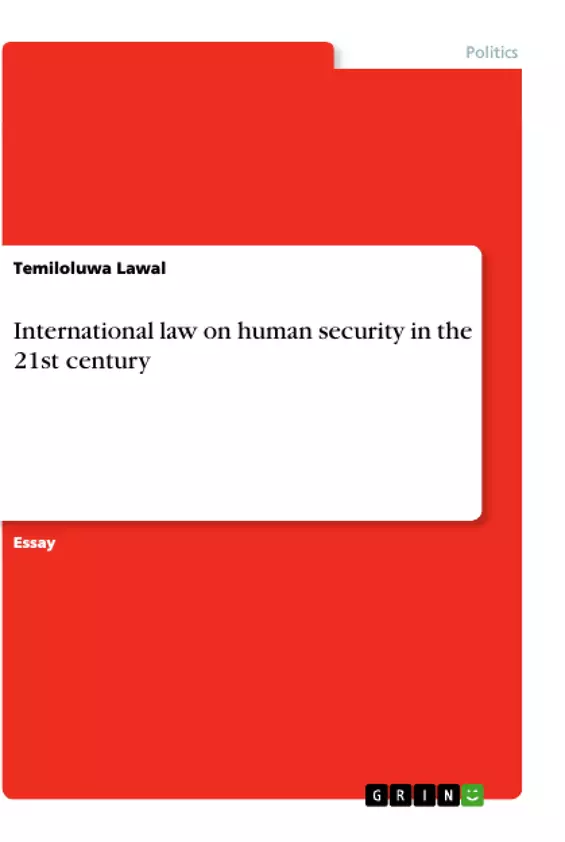This paper addresses the question of whether International law related to human security is adequate to address modern challenges, I argue in the affirmative, albeit partially. While I believe that International law in this area can certainly be improved upon as law, in general, is a dynamic phenomenon, it would be erroneous to assert that the laws are not adequate to address modern challenges to a considerable extent. In support of my position, I aim to advance the perspective that in matters concerning international human security law, we must draw distinctions between ‘adequate/adequacy’ and ‘application.' Whereas 'adequate' means "sufficient for a specific need or requirement." On the other hand, 'application' means "an act of putting something to use." It is my view that though international law is generally sufficient to address modern challenges, actions taken by international actors to tackle human security issues are usually unpredictable. 'Law,' being an institutional fixture, is enacted to ensure predictability and uniformity, and international law should be no exception. However, international actors are generally inclined to think and act otherwise. It is one thing to develop laws, and it is an entirely different matter to apply them. In further support of my position, I also seek to present the view and necessary evidence that the application of international law related to human security is majorly dependent on State policy and not the adequacy or otherwise of the law.
Humanity's duty to protect human security interests in both conflict and non-conflict situations is deemed essential. Accordingly, the need for a comprehensive and inclusive International legal framework on human security is justified. In the wake of the security issues that we have been confronted with in the past and those that continue to threaten our concerted safety, deliberations surrounding the adequacy or otherwise of International law related to human security vis-à-vis modern challenges are inevitable.
Inhaltsverzeichnis (Table of Contents)
- The United Nations Security Council (UNSC) Authorization and the responsibility to protect (R2P) doctrine of United Nations (UN)
- The UNSC
- The R2P Doctrine
- Use of Force by Invitation
- International Law Principle of State Sovereignty
- The Use of Force by Invitation
- Professional Responsibility
Zielsetzung und Themenschwerpunkte (Objectives and Key Themes)
This paper examines the adequacy of international law related to human security in addressing modern challenges. The author argues that while international law can certainly be improved, it is sufficient to address most modern challenges. However, the paper emphasizes that the application of international law is often unpredictable and heavily influenced by state policy.
- Adequacy of international law related to human security
- The role of state policy in the application of international law
- The responsibility to protect (R2P) doctrine
- The use of force by invitation
- Professional responsibility in the context of international law
Zusammenfassung der Kapitel (Chapter Summaries)
- The United Nations Security Council (UNSC) Authorization and the responsibility to protect (R2P) doctrine of United Nations (UN): This section examines the UNSC's role in maintaining international peace and security and the R2P doctrine, which was developed in response to humanitarian crises. The paper highlights the challenges faced by the UNSC in responding to conflicts, particularly the influence of the five permanent members with veto power.
- Use of Force by Invitation: This section explores the international law principle of state sovereignty and the exceptions to the prohibition on the use of force, particularly the concept of "use of force by invitation." The paper analyzes the legal framework surrounding state consent and the potential pitfalls of this practice.
- Professional Responsibility: This section examines the role of legal professionals in shaping state policy and the potential for abuse of power. The author discusses the "torture memo" written by John Yoo and Jay Bybee, highlighting the importance of upholding professional ethics and international law in the face of conflicting national interests.
Schlüsselwörter (Keywords)
The paper focuses on international law, human security, responsibility to protect, state sovereignty, use of force by invitation, professional responsibility, torture, and the Geneva Conventions.
Frequently Asked Questions
What is the "Responsibility to Protect" (R2P) doctrine?
R2P is an international political commitment to prevent genocide, war crimes, ethnic cleansing, and crimes against humanity when a state fails to protect its own population.
Is international law adequate for modern human security?
The author argues that while the laws are generally sufficient (adequate), the problem lies in their unpredictable application by international actors.
What is "Use of Force by Invitation"?
It is a legal concept where a sovereign state invites foreign military intervention to help deal with internal conflicts or security threats.
How does the UN Security Council influence human security?
The UNSC has the authority to authorize military action or sanctions, but its effectiveness is often hampered by the veto power of its five permanent members.
What role do legal professionals play in international law?
Legal professionals shape state policy. The paper highlights the danger of professional responsibility being compromised, citing the "torture memos" as an example.
- Arbeit zitieren
- Temiloluwa Lawal (Autor:in), 2021, International law on human security in the 21st century, München, GRIN Verlag, https://www.grin.com/document/1066324



